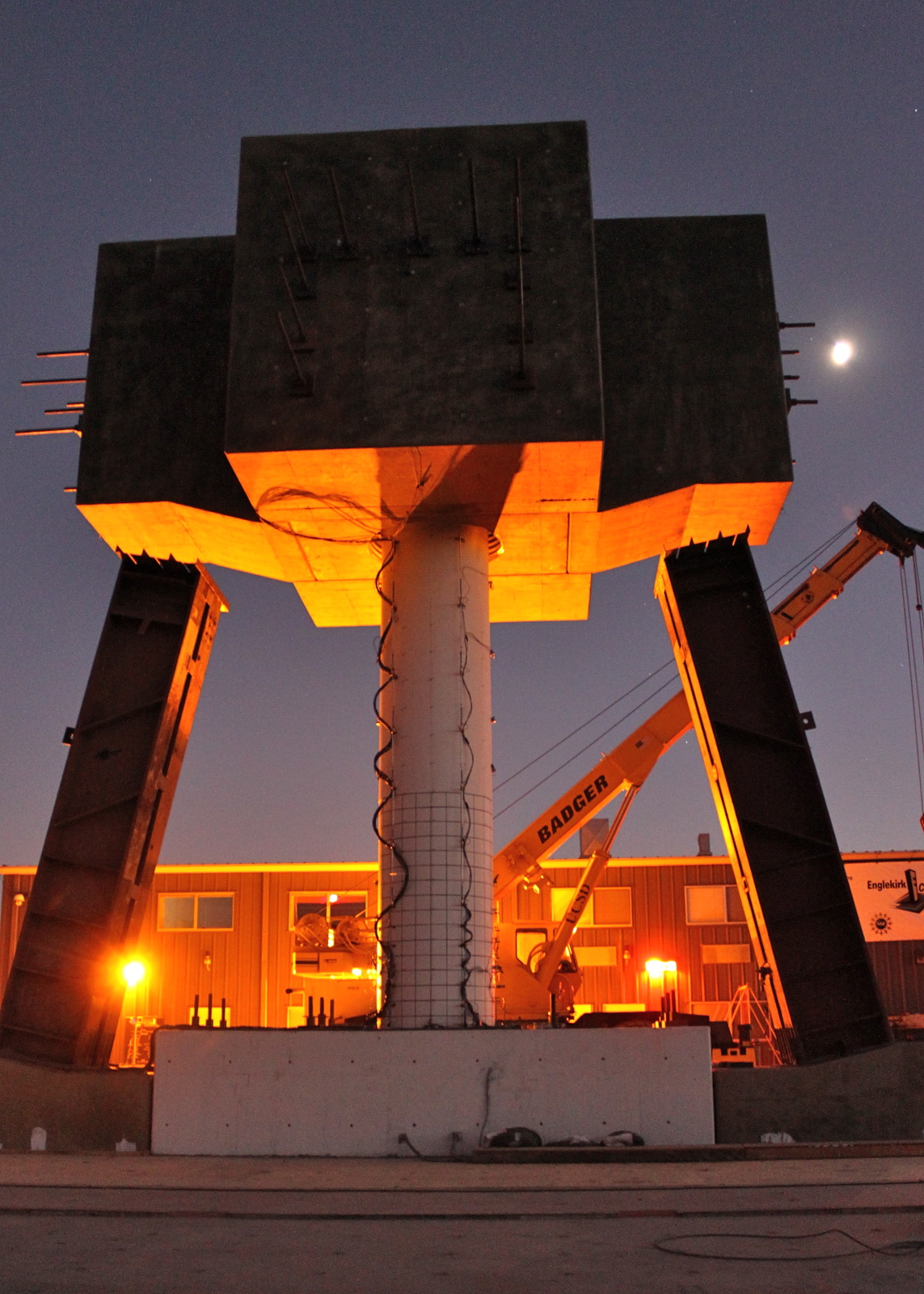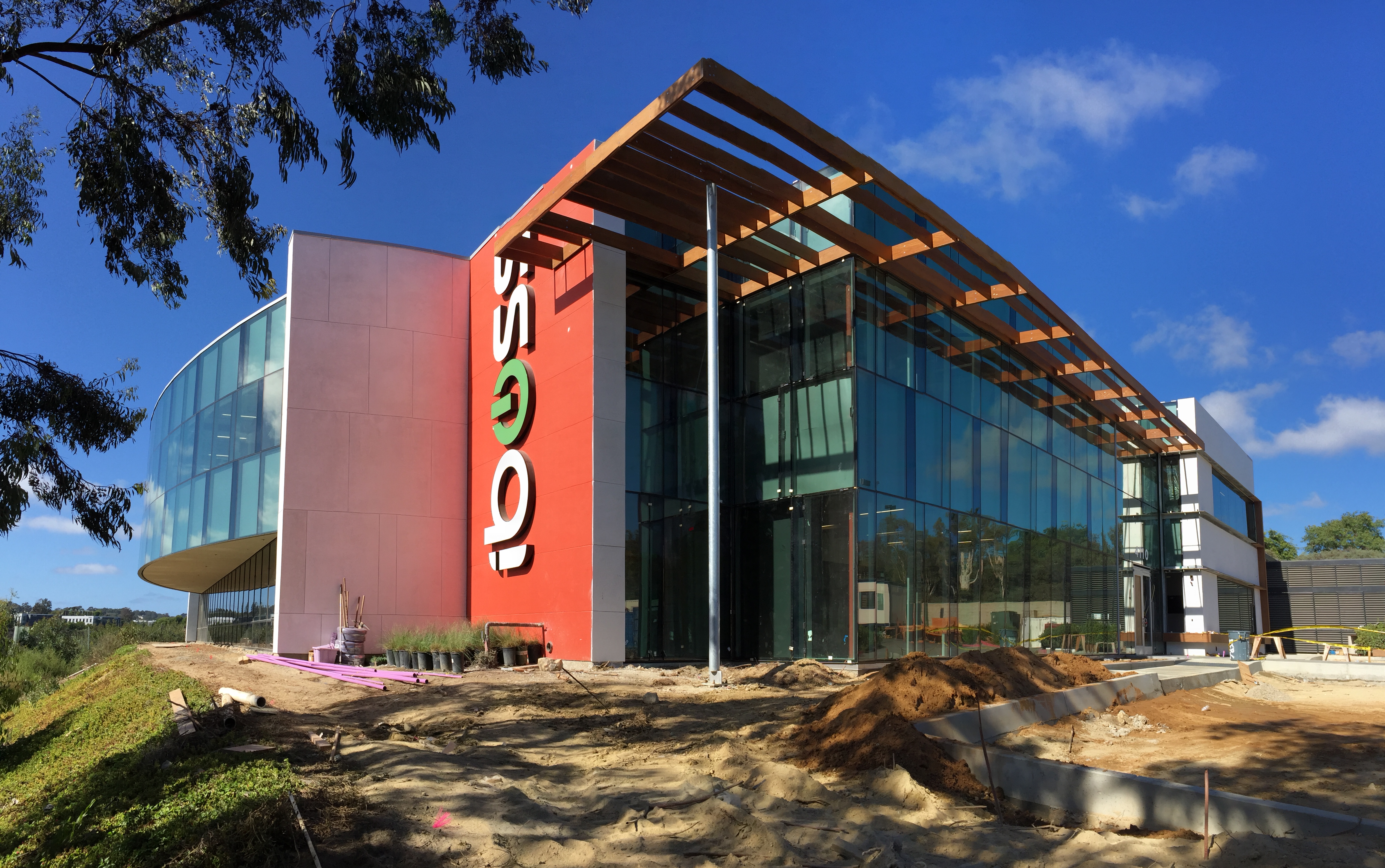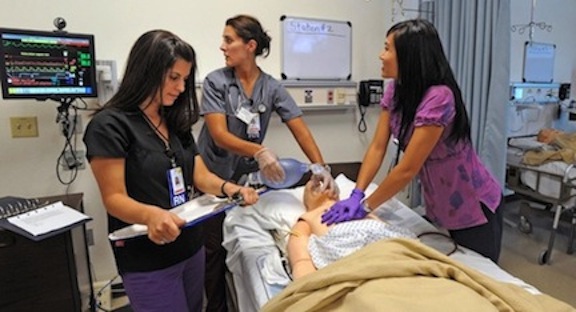Daily Business Report-Sept. 25, 2015
Engineers tested a 24-foot bridge column on the shake table in September 2010.
World’s Largest Shake Table Gets $5.2 Million
From the National Science Foundation
The University of California at San Diego has received a $5.2 million grant from the National Science Foundation (NSF) to run the world’s largest outdoor shake table for the next five years.
The table, which can carry structures weighing up to 2,000 tons, can replicate the ground motions of most of the world’s largest earthquakes. It has been used since 2004 as a resource for NSF-funded researchers from around the nation to test innovative technologies and designs for seismic safety of new buildings and retrofitting techniques for existing structures. The grant, awarded after a highly competitive process by NSF’s Natural Hazards Engineering Research Infrastructure (NHERI) Program, will provide funding for the facility’s operation and maintenance.
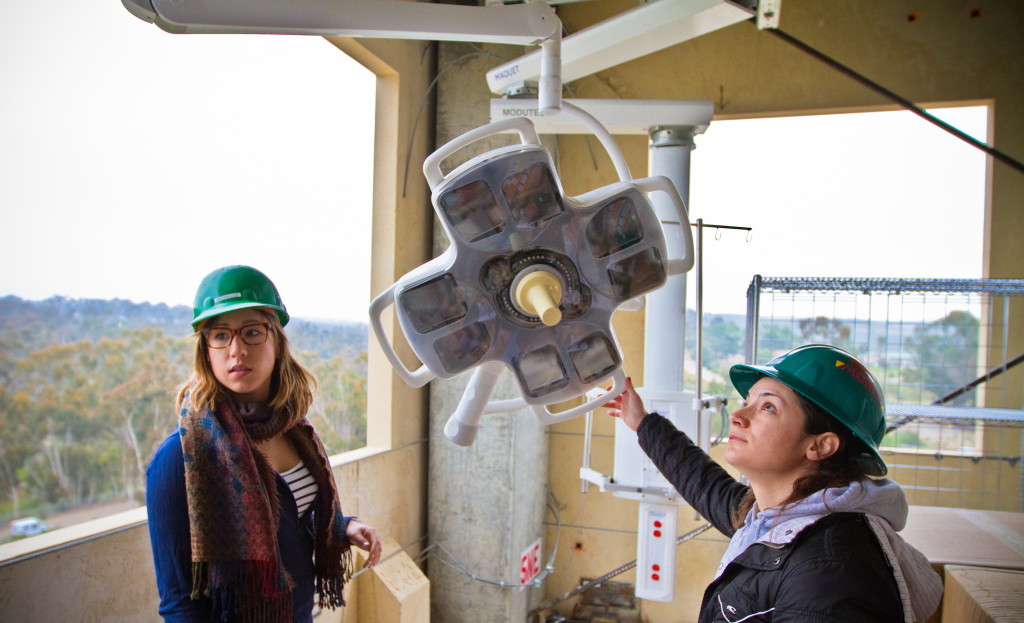
“The earthquake shake table is a unique and valuable research facility for the people of California, the nation and the world,” said Chancellor Pradeep K. Khosla. “The continued stream of research projects on the table will lead to safer buildings, bridges and renewable-energy infrastructure, advancing UC San Diego’s mission to engage in work that benefits humankind.”
In the past 11 years, research at UC San Diego’s shake table, which is housed at the Englekirk Structural Engineering Center, has led to important changes in design codes for commercial and residential structures and new insights into the performance of geotechnical systems, such as foundations, tunnels and retaining walls. It also has helped validate the use of new technologies to make buildings more likely to withstand earthquakes.
“We are working to continually improve design methodologies,” said Joel Conte, the grant’s principal investigator and a professor of structural engineering at the Jacobs School of Engineering at UC San Diego. “We are helping engineers come up with new concepts, new technologies and new seismic safety systems.”
“The UC San Diego structural engineers who run the shake table and steward this resource have a breadth and depth of expertise that is extraordinary,” said Albert P. Pisano, Dean of the UC San Diego Jacobs School of Engineering. “The UC San Diego shake table truly is a force multiplier for public safety in the face of strong seismic activity.”
Massive amounts of data are collected from each of the tests run on the shake table through networks of hundreds of sensors. These data are made available to civil engineers around the world, who can use them to validate and increase their confidence in their own models, without having to expend the money and time that would otherwise be required to perform their own tests.
______________________________________________

Water Authority to Study Options
For Camp Pendleton Desalination Plant
The San Diego County Water Authority’s board of directors approved a new agreement with U.S. Marine Corps Base Camp Pendleton to study seawater intake options for a potential desalination project on the base.
The board also authorized a $4.05 million contract for building, operating and reporting on a pilot-scale seawater intake testing program that’s expected to take about two years.
A potential Camp Pendleton desalination project is viewed by the Water Authority as a long-term water supply option for the region that could come online after 2030. In the near-term, the next increment of local water supply for the region is expected to be purified water projects under development by Water Authority member agencies. The board will have several opportunities over the next decade to make decisions about advancing a potential Camp Pendleton project in light of future regional water supplies and demands.
The Water Authority has been working with base officials since 2007 on feasibility and technical studies for a seawater desalination project at the southwest corner of the base that would produce 50 million gallons to 150 million gallons a day. Such a facility could provide a unique and strategic opportunity to help meet the region’s future water needs and support vital national defense operations, according to Water Authority officials. If the board and the base decide to move ahead with a full-scale project in the future, it would take a decade or more to complete.
“Given the long lead time for developing seawater desalination projects in California, incremental development activities such as these intake studies will maintain a potential Camp Pendleton project as a viable alternative,” said Mark Weston, chair of the Water Authority’s board. “This research will help us understand the most environmentally friendly and economically feasible alternatives for water intakes as we consider all the other complex factors involved with securing a reliable long-term water supply for our homes and economy.

Carlsbad Strawberry Field
Development Foes Want Referendum
City News Service
Opponents of a planned upscale retail and dining center that would overlook the Agua Hedionda Lagoon in Carlsbad turned in more than 9,100 petition signatures Thursday in a bid to put the project before voters.
The plan by Los Angeles open-air shopping mall developer Caruso Affiliated would preserve 85 percent of about 203 acres of open space near Interstate 5 and Cannon Road. Much of the property has been used for decades to grow strawberries.
The company contends the project will maintain most of the open space and allow the popular farming operation to continue. The development plans have already been approved by the Carlsbad City Council.
However, a group called Citizens for North County formed to oppose the Caruso project, and has received backing from the Sierra Club of San Diego, League of Women Voters and local chapter of the Surfrider Foundation, among other organizations.
The group opposes the council’s approval of the project, which allowed it to bypass the normal environmental review. Members of the group want the project to go before the city’s voters.
State law requires a referendum to have valid signatures from 10 percent of a locality’s registered voters to force action by the City Council. In Carlsbad’s case, that’s over 6,000 signatures, according to data from the San Diego County Registrar of Voters.
If enough signatures are deemed valid, the City Council will have to decide whether to call an election for sometime next year.
Scripps First in Region to Implant New
Defibrillator Approved for Use with MRI Scans

Scripps Health is the first health care provider in San Diego County to use the only implantable cardioverter defibrillator device approved for use with magnetic resonance imaging (MRI) scans.
The milestone is an important one for patients who rely on ICDs to detect irregular heartbeats and deliver life-saving therapy to restore a normal rhythm. Until now, patients with earlier generations of ICDs have not been able to receive MRI scans or have been limited to obtaining an MRI as part of a research study.
“There is no way to predict who will need an MRI,” said Scripps Clinic cardiologist John Rogers, M.D., who implanted the new device in a patient Wednesday evening. “We are grateful to have this new technology that allows ICD patients to receive an MRI of any area of their body without limitation or concern about troublesome interactions.”
FDA Sends Pathway Genomics
Warning Letter Over Liquid Biopsy Test
GenomeWeb
San Diego-based Pathway Genomics has received a letter from the U.S .Food and Drug Administration saying that it has concerns about a new liquid biopsy test for cancer offered by the company, as well as the way Pathway is marketing the test.
Specifically, the agency has questions about CancerIntercept Detect, a test launched by Pathway earlier this month that detects tumor DNA in high-risk but otherwise healthy patients, according to a press release from the company. The liquid biopsy test analyzes the presence of 96 frequently occurring DNA mutations in nine cancer genes — though the FDA letter said that Pathway claims it can identify DNA mutations in 10 genes — and is priced as low as $299.
Simultaneous to the launch of CancerIntercept Detect, Pathway made available CancerIntercept Monitor for monitoring patients with active or previously diagnosed cancer. However, the FDA letter does not mention that test.
Among the concerns raised by the FDA is that it believes Pathway is using a “direct-to-consumer type model” to market the test. “Under this model, you ship blood collection tubes, a medical device, for use” with the test, the agency said, adding that it has no record of having approved, cleared, or listed the test.
“We also have examined published literature and have not found any published evidence that this test or any similar test has been clinically validated as a screening tool for early detection of cancer in high-risk individuals,” FDA said in its letter.

Shea Homes’ One Channel Island Honored
Shea Homes’ One Channel Island has been honored as San Diego’s best new home community by the Building Industry Association of San Diego County.
One Channel Island, located in Encinitas, was recognized for innovations inside and out, including richly detailed Coastal Plantation architecture, cusomized interior layouts and a focus on environmental efficiencies.
The sales team representing Shea Homes at One Channel Island — Stephanie DeGasperis and Nicole Amuchastegui — were named as 2015’s Sales Professionals of the Year.
San Diego Sport Innovators Accepting
Applications to Business Accelerator Program
San Diego Sport Innovators (SDSI), the nonprofit business development organization, is now accepting applications to its business accelerator program, SDSI Springboard.
“SDSI Springboard is a four month, intensive mentoring process dedicated to fostering the next generation of sport and athletic lifestyle companies into sustainable and scalable businesses,” said Renne Catalano, SDSI’s program director.
The program is open to sport and active lifestyle companies of all sizes who are facing significant milestones such as launching a new product, starting a new business, shifting their business model, preparing to raise capital or working through a significant growth phase.
The industry veterans that make up SDSI Springboard’s mentor group volunteer their time to provide advice on how to help growing business succeed. Accepted companies are paired with CEOs, finance experts and marketing experts to help refine their business models and become better positioned for developing strategic partnerships, building their team and advisers, launching a new product/service, securing investment and overall success.
Fifty companies have graduated since 2009, have raised $40.4 million dollars in capital funding and have created 315 jobs.
Applications are free. Upon acceptance, the Springboard tuition is $1,000 and includes a year membership to SDSI. Apply through Oct. 18 at
http://sdsportinnovators.org/springboard/.
Sequenom Lowers Full-Year Revenue Estimate
GenomeWeb
San Diego-based Sequenom said today that its second-half 2015 revenues will be lower than previously anticipated and has accordingly dropped its full-year revenue guidance to a range of 15 percent to 23 percent lower than its previous estimate of $150 million to $170 million.
The firm expects second-half 2015 revenues to be in the range of $57 million to $61 million and full-year revenues to be between $127 million and $131 million.
The firm said in a statement that increased competition as well as price compression in the noninvasive prenatal testing market affected its forecasted revenues.
Interim President and CEO Dirk van den Boom called 2015 a “pivotal year,” but also a “year of transition,” for Sequenom.
In a research note following the announcement, William Quirk, a senior analyst with Piper Jaffray, wrote that while Sequenom’s lower guidance was not a huge surprise — given that the Street’s revenue estimate was already below the firm’s previous forecast and that new CEOs frequently lower forecasts — the magnitude of the cut was unexpected.
As a result, the investment bank updated its second-half revenue forecast to $60.4 million, down from $69.5 million, but near the upper end of Sequenom]s range.
Analysts’ average full-year revenue estimate is $141.1 million. Sequenom plans to report its third quarter financial results on Nov 4.
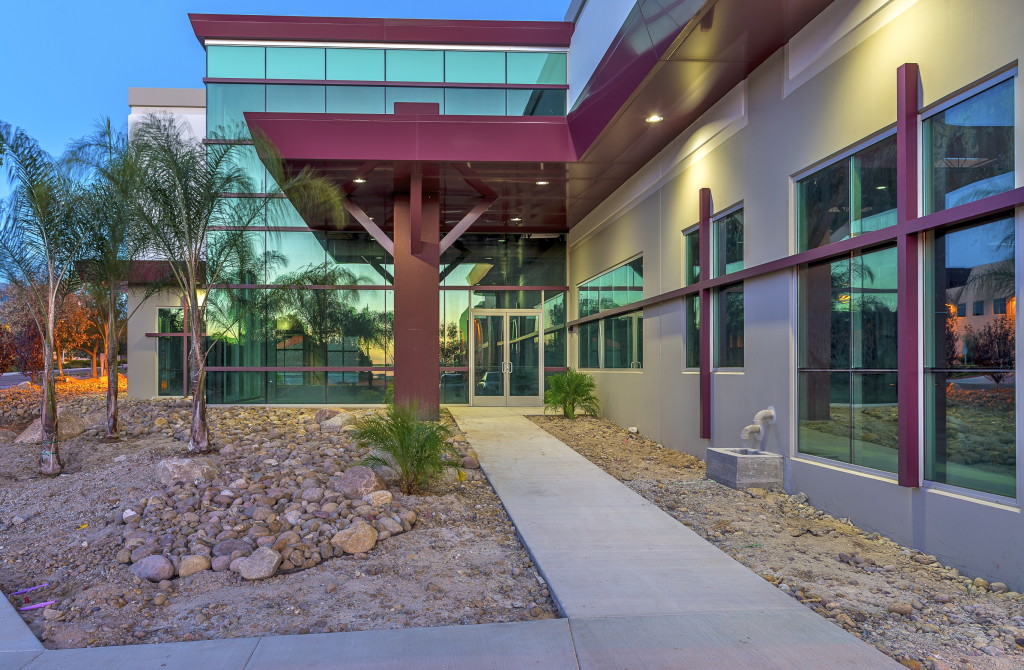
Techbilt Completes 2 Spec Industrial
Buildings in Poway Corporate Center
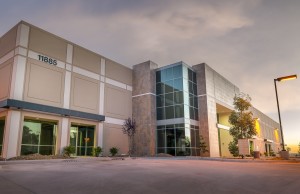
Techbilt Companies, a San Diego-based developer, announced today that construction is complete on two new spec industrial buildings located in the company’s Poway Corporate Center at 11885 and 11895 Community Road in Poway. Both buildings were fully leased prior to the completion of construction.
Best Buy will occupy 11885 Community Road with a lease valued at $3,170,890. The building is 46,035 square feet and features 18 dock-high loading doors. Grace Digital, a San Diego-based consumer electronics company that currently occupies 9,395 square feet in Poway Corporate Center, will expand its operations to occupy 11895 Community Road with a lease value at $1,940,968. This building is 24,883 square feet and features two dock-high loading doors.
Techbilt also announced plans to begin construction on a 100,000-square-foot spec industrial building on the final two lots of Phase Three. The building will feature an approximately 28-foot clear height, 20 dock-high truck doors, and three grade-level truck doors with construction beginning first quarter 2016.
Phase One began construction in 1990, and currently features more than 390,000 square feet of corporate orporate headquarters and industrial space.
Phase Two began construction in 2000 with the last building completed in 2007.
Phase Four began construction in 1996 and features Costco and Home Depot.

